The AMD 3rd Gen Ryzen Deep Dive Review: 3700X and 3900X Raising The Bar
by Andrei Frumusanu & Gavin Bonshor on July 7, 2019 9:00 AM EST** = Old results marked were performed with the original BIOS & boost behaviour as published on 7/7.
Benchmarking Performance: CPU Encoding Tests
With the rise of streaming, vlogs, and video content as a whole, encoding and transcoding tests are becoming ever more important. Not only are more home users and gamers needing to convert video files into something more manageable, for streaming or archival purposes, but the servers that manage the output also manage around data and log files with compression and decompression. Our encoding tasks are focused around these important scenarios, with input from the community for the best implementation of real-world testing.
All of our benchmark results can also be found in our benchmark engine, Bench.
Handbrake 1.1.0: Streaming and Archival Video Transcoding
A popular open source tool, Handbrake is the anything-to-anything video conversion software that a number of people use as a reference point. The danger is always on version numbers and optimization, for example the latest versions of the software can take advantage of AVX-512 and OpenCL to accelerate certain types of transcoding and algorithms. The version we use here is a pure CPU play, with common transcoding variations.
We have split Handbrake up into several tests, using a Logitech C920 1080p60 native webcam recording (essentially a streamer recording), and convert them into two types of streaming formats and one for archival. The output settings used are:
- 720p60 at 6000 kbps constant bit rate, fast setting, high profile
- 1080p60 at 3500 kbps constant bit rate, faster setting, main profile
- 1080p60 HEVC at 3500 kbps variable bit rate, fast setting, main profile
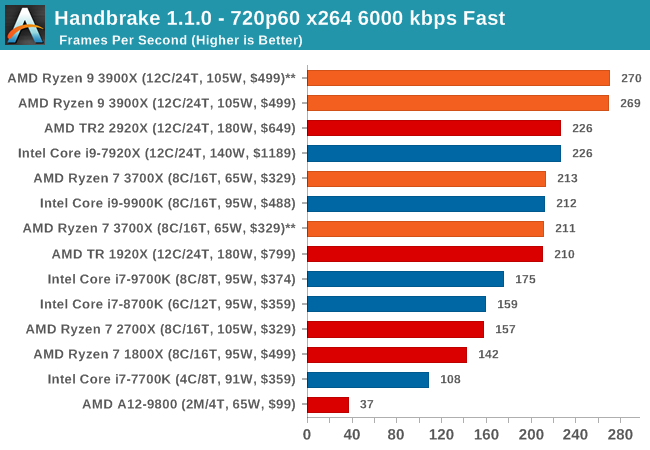
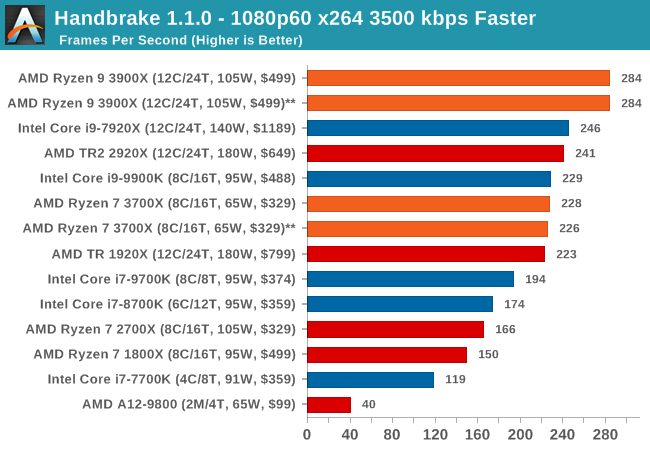
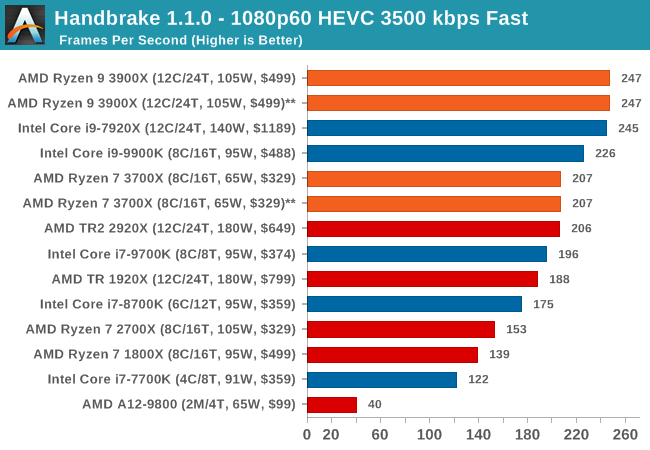
7-zip v1805: Popular Open-Source Encoding Engine
Out of our compression/decompression tool tests, 7-zip is the most requested and comes with a built-in benchmark. For our test suite, we’ve pulled the latest version of the software and we run the benchmark from the command line, reporting the compression, decompression, and a combined score.
It is noted in this benchmark that the latest multi-die processors have very bi-modal performance between compression and decompression, performing well in one and badly in the other. There are also discussions around how the Windows Scheduler is implementing every thread. As we get more results, it will be interesting to see how this plays out.
(Please note, if you plan to share the Compression graph, we'd appreciate it if you could please include the Decompression graph as well. Otherwise you’re only presenting half of the picture)
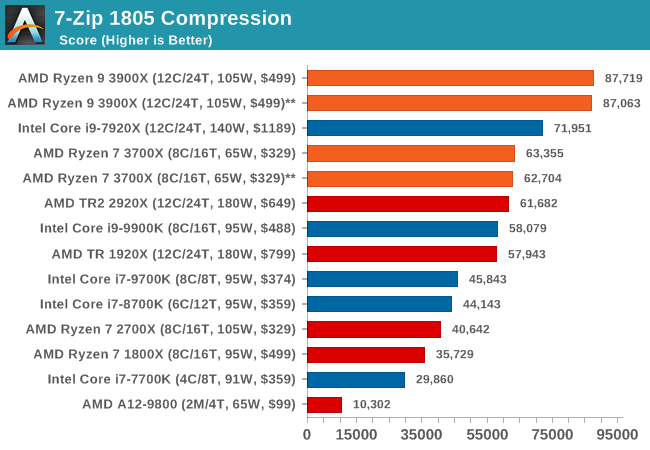
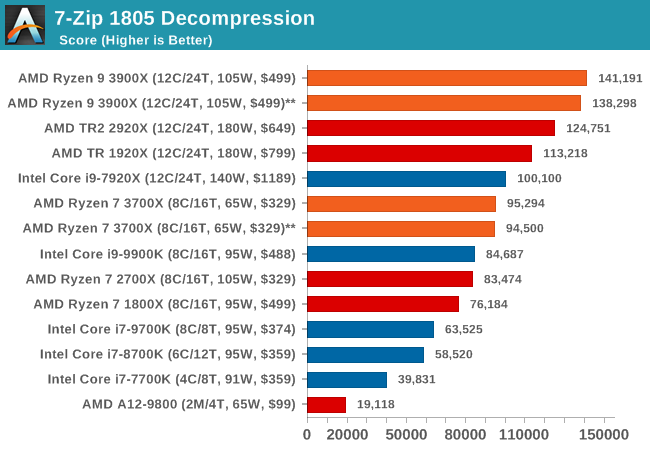
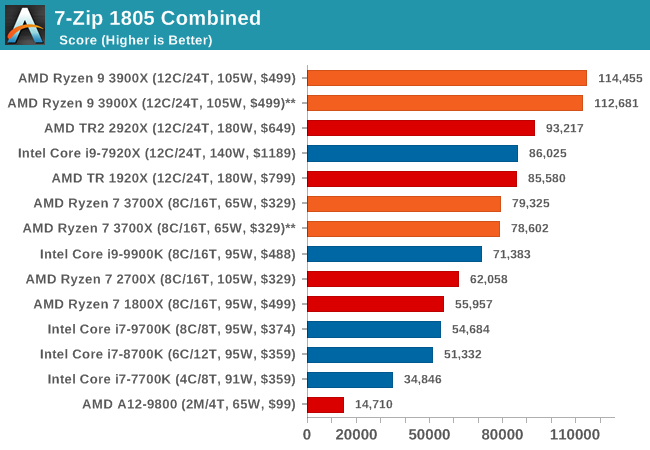
WinRAR 5.60b3: Archiving Tool
My compression tool of choice is often WinRAR, having been one of the first tools a number of my generation used over two decades ago. The interface has not changed much, although the integration with Windows right click commands is always a plus. It has no in-built test, so we run a compression over a set directory containing over thirty 60-second video files and 2000 small web-based files at a normal compression rate.
WinRAR is variable threaded but also susceptible to caching, so in our test we run it 10 times and take the average of the last five, leaving the test purely for raw CPU compute performance.
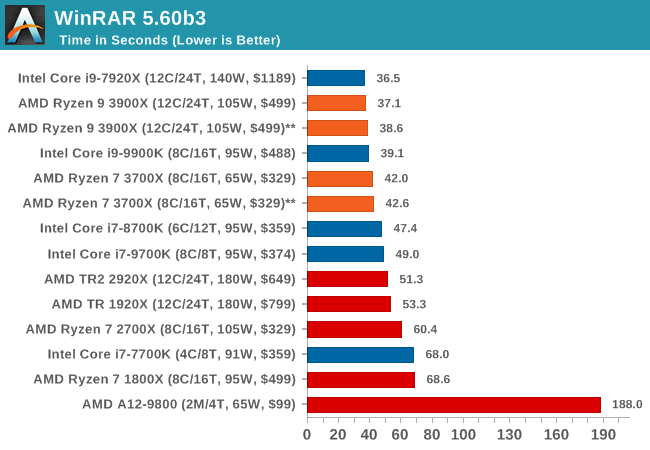
AES Encryption: File Security
A number of platforms, particularly mobile devices, are now offering encryption by default with file systems in order to protect the contents. Windows based devices have these options as well, often applied by BitLocker or third-party software. In our AES encryption test, we used the discontinued TrueCrypt for its built-in benchmark, which tests several encryption algorithms directly in memory.
The data we take for this test is the combined AES encrypt/decrypt performance, measured in gigabytes per second. The software does use AES commands for processors that offer hardware selection, however not AVX-512.
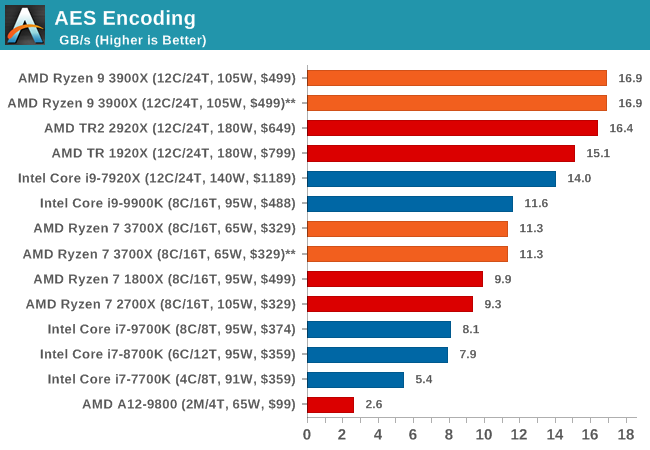










447 Comments
View All Comments
Korguz - Monday, July 22, 2019 - link
Maxiking, and HOW LONG till intel gets the SAME treatment?? saying a processor uses x watts, but in reality uses 50 to 100 watts MORE isnt FRAUD ??? hell you confine intels cpus to the watts they state, and their performance goes DOWN THE TOILET !!!. again .. you KEEP saying AMD is a fraud, but you STILL refuse to admit, that intel is a fraud as well..does this guy even acknowlege the issue with intel and the amount of power they " say " their cpus use, and how much power they REALLY use ??
Korguz - Monday, July 22, 2019 - link
further.. intel doesnt do any marketing, cause they DON'T want the general average user to know the cpu they bought, uses MORE power then has been stated, THAT also is false advertising, come on maxiking, go after intel as well, the same same things you are accusing amd of...Maxiking - Tuesday, July 23, 2019 - link
You are uneducated, TDP doesn't mean power consumption but the amount of heat dissipated, it informs you how much of heat the cooler must be able to dissipate in order to keep the cpu cool enough to run.Get it? 1700x TDP was 95W yet there were tasks it managed to consume 120 or even 140w on stock settings. Like do you even watch reviews? It was the same with 2700w.
but mimimimimimi AMD good mimimimimi Intel bad
Korguz - Tuesday, July 23, 2019 - link
sorry dude.. but YOU are uneducated, amd stays A LOT closer to its stated TDP then intel does, AT even did a review on it. power dissipated, also relates to power used. but it also doesnt help, that amd and intel both use the term TDP differently. either way.. intel uses more power then amd does.https://www.anandtech.com/show/13544/why-intel-pro...
Maxiking - Tuesday, July 23, 2019 - link
Again, TDP is not power consumption and it refers to a cooler.You are uneducated and fabricating because you are an amd fanboy. No one really cares about what is more accurate or not, because it does not say anything about power consumption of the chip.
So keep living in your nice little bubble. It is not my fault that you and other sites have been thinking that TDP -> power consumption. I will share something new to you again.. Ever heard about that Frankenstein novel? Frankenstein in not the monster but the doctor, his surname..Shocking I KNOW!!!
mimimimimimi AMD good mimimimimi Intel bad
Korguz - Tuesday, July 23, 2019 - link
again.. TDP, or Thermal Design Power, does relate to power consumption and how much is needed to keep something cool. You are uneducated and fabricating because you are an intel fanboy. i also notice you like to throw personal insults around when someone disagrees with you, or to try to make your opinion valid. so you keep living in your nice little bubble as well, not my fault you dont understand TDP relates to how much power something uses, as the more power a product uses, the more heat it creates, and then, needs to be removed.mimimimimimi intel good mimimimimi amd bad
Maxiking - Thursday, July 25, 2019 - link
What you just did it is just sad. it shows you are little kid.TDP is not power consumption, if TDP - 100% power consumption, it would mean that 100% of the electrical energy is converted into thermal energy so yeah which is impossible it would mean perpetuum mobile you twat, actually the cpu would be net positive, it would convert 100% of electrical energy into thermal whilst managing to perform another task at no energy cost.
Breaking the laws of physics just because of your AMD fanboyism
Korguz - Thursday, July 25, 2019 - link
i said it RELATES to power consumption, what, you cant read ?? cant see passed your intel bias ?? the more power something uses, the more heat it generates, and there for, the more needs to be dissipated, and i also never said anything about 100% power consumption, pulling words and making things up to try to make your self sound right ? And you are calling me names on top of that, who's the kid here ???Maxiking - Tuesday, July 23, 2019 - link
You are uneducated, TDP doesn't mean power consumption but the amount of heat dissipated, it informs you how much of heat the cooler must be able to dissipate in order to keep the cpu cool enough to run.Get it? 1700x TDP was 95W yet there were tasks it managed to consume 120 or even 140w on stock settings. Like do you even watch reviews? It was the same with 2700w.
but mimimimimimi AMD good mimimimimi Intel bad
Qasar - Tuesday, July 23, 2019 - link
hmmm doest really say amd is being fraudulent, just doesnt like the idea the chips might not boost, or run at what AMD says, but didnt mention fraud...and Korguz has a point.. WHY arent you commenting about the power intels cpus use, vs what intel says they use ?